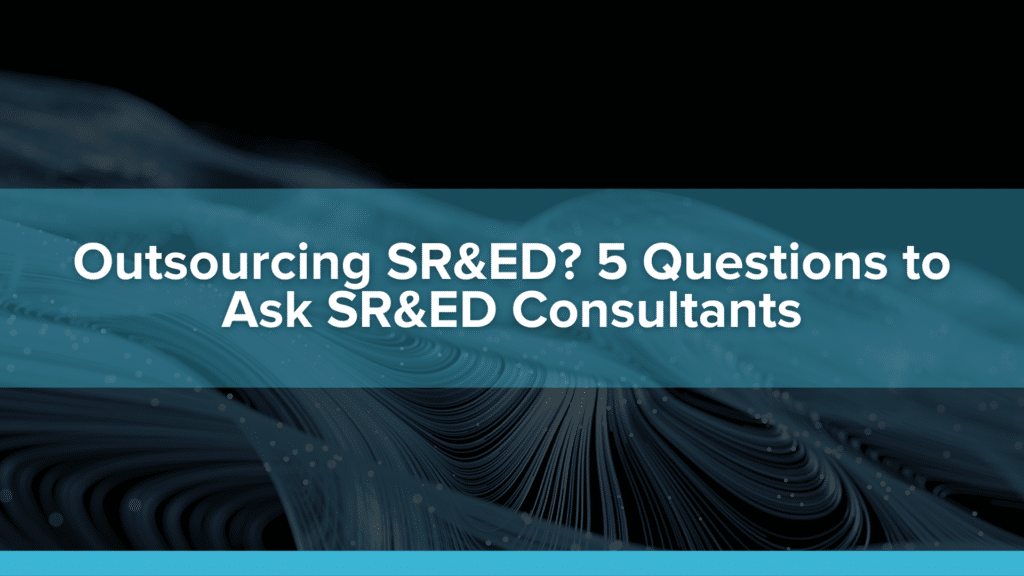You’ve decided to outsource your SR&ED claim to the pros. Great decision! (If you’re still deciding whether to do it yourself or outsource, check out this helpful blog post)
Before you agree to work with the first SR&ED consultant who approaches you, take the time to ask them these five questions:
1. How many SR&ED claims have you processed?
This question sounds obvious and straightforward, but make sure you fully understand their SR&ED filing experience. The more important sub-question here is ‘How many SR&ED claim reviews/audits have you worked through and have successfully defended?’ You want someone who has as much experience as possible AND who is willing to work with you in case of a review.
In addition, quiz their knowledge about the most recent changes to the SR&ED program and how it may directly impact your claim. (Before asking this question, you may want to review the SR&ED program yourself and prepare your own questions beforehand!)
2. Does your team have experience preparing SR&ED claims in my industry?
Different claims in different industries require different approaches. Yes, this sounds vague but it is very straightforward. The consultant needs to understand the industry standard practices and how your R&D activities go above and beyond standard practice (whether it’s engineering, software development, or science).
Be sure to ask them how they approach the technical side of the claim. Do they have a solid understanding of your technology or development and will they be able to properly explain the advancement(s)?
For example, some claims in the software development industry are better suited for a technical-based firm that will have a better understanding of the technical achievement. Other skill sets may not fully comprehend the complexity and magnitude of your innovation, and therefore not be able to identify SR&ED eligibility of all of the projects.
3. Who will be preparing my claim?
This question is often over-looked during initial conversations. It tends to become more apparent once you’ve signed a service contract and are in the middle of gathering the technical documentation.
Ask them who exactly will be preparing your claim. Is it an in-house staff member or do they outsource the work to a third party?
In large organizations, many times the senior person you met with initially does not actually handle the claim. It gets processed by a junior level employee with far less experience. In this situation, it is good to ask about internal quality assurance processes so that you can ensure a senior/more experienced consultant reviews all the work before it goes out the door.
Bonus: click here to download this 20-page SR&ED Guide to learn everything you need to know to prepare a successful claim.
4. How and when do you get paid?
By now, you’ve probably realized that this is a complex service and that there would be fees involved. Make sure you ask how and WHEN your service provider gets paid.
Some consultants offer their services on a contingency basis – they only get paid once your claim has been successfully processed. So it will take a few months until they get paid, but at least you know that you both have ‘skin in the game’ and will put in every effort to make that claim go thru successfully.
In contrast to contingency fees, providers may request payment upfront. While this is fair for the provider, keep in mind that you’ll have already paid someone for their work with no guarantee that your claim will be successful or not…
We’ll leave the contingency vs. upfront payment debate for a later post, but ultimately it is up to you and what you are most comfortable with.
5. How are your fees structured?
Do they charge a flat fee or is a tiered approach? Is it flexible?
Some consultants charge a flat rate percentage on the successful amount of investment tax credits (ITCs) you/they claimed. Regardless of the size of the claim, they could take anywhere from 15 – 25% of your claim. It varies per firm.
Others have taken on a tiered approach so that their percentage decreases as the amount of ITCs claimed increases. It really depends on the potential size of your claim and how confident you are in your service provider.
The terms of engagement could also play a factor in deciding who you want to go with: How many years will you be working with this provider? Do you plan on spending more on R&D in the next few years? Does the length of the service contract impact the fee or rates?
In summary, we want to equip you with thought-provoking questions to help you determine the right SR&ED consultant for your company’s needs. An experienced SR&ED consulting firm will happily address all of your questions and needs upfront. However, the most important question is to ask yourself is whether you trust them and are confident in their abilities to maximize your potential SR&ED claim. they will review highly confidential and private information. They will get to know your company and many of its employees quite well. The best SR&ED consultants will be right beside you throughout the process, and especially in case of a review.
Have a question? Send us a note!
[optinform]









